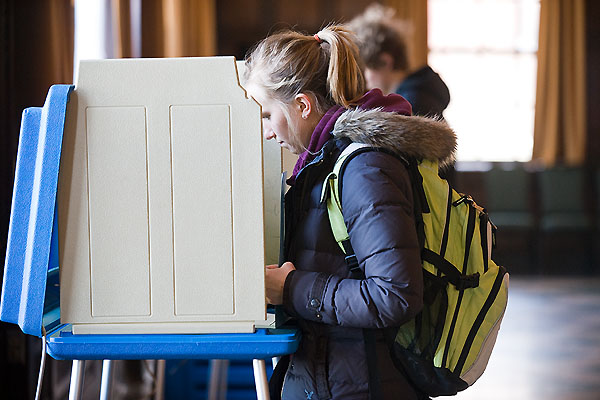The Youth Vote Unlikely To Be Strong Enough to Sway Election


The youth vote has the power to sway the 2012 elections but the millennial generation is not as likely to show up this Election Day.
In 2008, the youth vote gave Obama an edge over McCain. Arthur Levine and Diane Dean, authors of "Generation on a Tightrope: A Portrait of Today's College Students," told Huffington Post that in 10 of the 12 battleground states, the numbers of college students are larger than Obama's overall margin of victory in 2008. According to a Gallup poll, of the 60% young people registered to vote, only 56% of them said they definitely plan on voting. That number falls short of the 80-86% of voters above the age of 30 that say they will cast their vote November 6.
Candidates have been vying for the youth vote across the country by visiting colleges in key states and addressing issues like college tuition. Romney told students in New Hampshire that while he wants to address raising tuition, he does not plan to help pay off student loans or increase grants. "What I want to do is give you a great job so you'll be able to pay back yourself," he said. "And I want to get the government off your back, so you can keep more of what you earned."
Obama made a connection with young voters in 2008, but with a difficult job market and raising tuition costs many have become disenchanted. His approval rating from 18-29 year olds is 54% according to a 2012 Gallup Poll.
Campaigns such as Rock the Vote and iVote are reaching out to the youth across the country. These groups are targeting college campuses and concert venues to rally first time voters. Ohio Organizing Collaborative representative Myranda Owca works to register voters at Ohio University through the statewide nonpartisan political nonprofit. "We want to encourage young people and students to use their voices and vote on issues that relate to young Americans," Owca said.
According to Rock the Vote, with 44 million eligible voters, youths are the largest generation in history and represent more than one-fifth of the electorate. While the number of young voters doubled in 2008, they are still the smallest share of voters overall. Director of Polling at the Harvard Institute of Politics, John Della, told PBS, "The largest segments of undecided voters in America I think will be found on college campuses. We're seeing more than 10 percent of 18- to 24-year-olds at this point in the campaign that are still undecided. So that is a significant number."
Many issues slated for this upcoming election affect young voters. The outcome of the Medicare debate will determine whether the social insurance program will be around when they are eligible. Social issues such as LGBT rights and women's reproductive rights are also important to young voters. Although they have rallied behind many causes, they have not rallied behind the candidates in the volume that they had in 2008.
Young voters planning to cast their ballot for the first time should familiarize themselves with the process beforehand. A HeadCount info-graphic shows which states allow students to use their college ID for identification, making it easy for all students to vote on election day. The Brennan Center for Justice also offers a helpful guide for students and first time voter looking for direction during the next few weeks.



